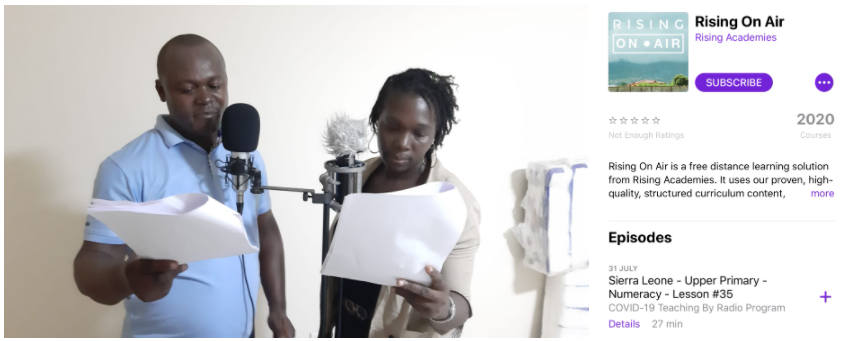Rising On Air — our free distance learning solution that redesigns our proven, high-quality, structured curriculum content for delivery via radio and SMS — has reached over 10 million children in 25 countries. The scale of that reach creates opportunities to continue adapting both our curriculum content and the way we deliver it to students in some of the most remote parts of the world.
When schools closed across Liberia on March 16, radio was our go-to platform to bring audio lessons to students — in both Liberia and Sierra Leone, only 1 out of 8 people have access to the internet, making online learning impossible. Radio is much more ubiquitous, reaching 70% of the population in both countries, according to our estimates.
By sharing our audio lessons via the new Rising On Air podcast, we hope to enhance our initial efforts by making our curriculum available in a more flexible format that allows students to catch up with lessons if they miss a broadcast. We also hope to better serve students with learning disabilities, as podcasts can be played back multiple times and at variable speeds.
We are sharing our audio lessons via a podcast after thinking about the Tecno phones most Liberians own. Since podcasts require just one download, after which they can be played offline, they are accessible to students who can afford only limited data and live in rural areas where network signals are unreliable.
Our audio lessons are compatible with any standard podcasting app, though we recommend installing the open source AntennaPod app from the Google Play Store, as it does not require much memory to run, and is therefore ideal for low memory phones like Tecno. The availability of apps like AntennaPod allowed us to transfer our lessons to a podcasting format without investing in building out our own infrastructure.
We also hope this feature will benefit our partners and others looking to adapt our lessons by making it easy to listen to how we have transformed our scripts into audio lessons. The scripts available to download on our website are culturally generic — we wanted to demonstrate how to tailor these for different contexts, by adding local background music or providing culturally relevant examples.
However, we are aware that the way we have customized the audio lessons currently on the podcast will not necessarily resonate with students who are not based in Liberia and Sierra Leone. For this reason, we’ve been looking at opportunities, working with our partners at the EdTech Hub, to create a series of more universal podcasts so that the audio content is more culturally appropriate for a global audience.
In the meantime, we are interested in collaborating with our global partners to include their adapted audio lessons on our podcast portal, after screening and evaluating all lessons to assure quality. Though we launched Rising On Air to reach students during the COVID-19 pandemic, delivering lessons via radio and podcasts is an evergreen solution that should persist beyond this emergency.




